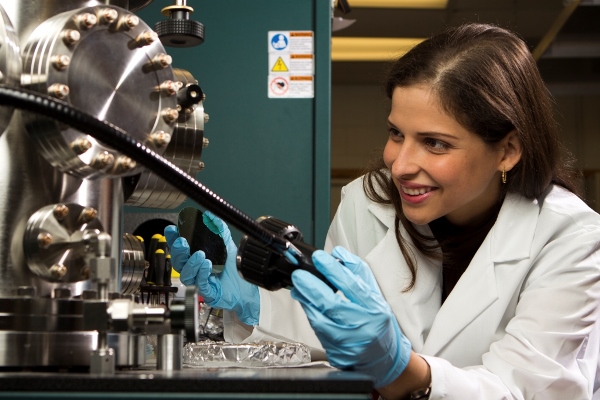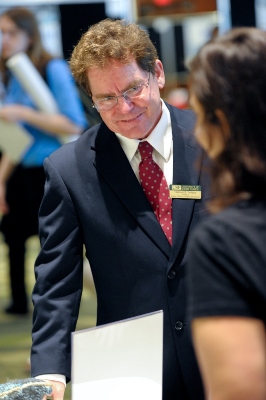
The STEM Academy program concept is modeled in part after the highly successful pre-college STEM Academy programs
developed to inspire high school students to enroll in STEM undergraduate programs. Photo | USF News.
By Vickie Chachere
USF News
TAMPA, Fla. (May 29, 2014) - The Howard Hughes Medical Institute has selected the University of South Florida for a five-year, $1.2 million grant to develop and implement a summer STEM Academy enrichment program for entering first-year students as part of a sweeping, $60 million effort to reinvigorate science instruction at 37 leading research universities.
USF's proposed STEM Academy program concept was successful through three-rounds of a competitive grant program that attracted 170 applicants.HHMI – which for more than a quarter-century has supported universities in improving undergraduate education – challenged research universities in 2013 to develop new approaches to science, technology, engineering and math education as part of a sweeping effort to bolster the nation's scientific and technological capabilities, particularly among populations under- represented in the sciences.
While USF is the second-leading producer of STEM graduates among Florida's universities, only four out of every 10 students who enter USF as STEM majors complete their intended degree. The HHMI funded program will align with ongoing efforts aimed at strengthening and expanding introductory science courses, as well as academic support programs needed for students to progress on to upper division courses. The HHMI program will be led by Richard Pollenz, Associate Dean of Undergraduate Studies and the Director of the Office for Undergraduate Research, as well as a team of highly-skilled faculty members.
"This funding from HHMI is a significant step in the USFs continued efforts toward creative STEM education reform and the commitment to graduate the most highly qualified students who can apply what they have learned," Pollenz said. "It also puts USF at the table nationally and validates the efforts of many faculty and administrators who truly value the quality of teaching and the development of innovative academic programming that will serve as models to other institutions.I am excited to be involved in this project and the leadership team is ready to help our students' see all that is possible if they commit to a STEM major."

Richard Pollenz
The STEM Academy program concept is modeled in part after the highly successful pre-college STEM Academy programs that Pollenz and faculty members developed in 2012 to inspire high school students to enroll in STEM undergraduate programs.
USF enrolls an average of 1,500 to 1,800 highly diverse
first-year students in STEM disciplines each year, and experiences alevel
of attrition consistent with other universities across the nation. The
national trend has spurred many state and federal agencies to fund innovative
programs to address STEM persistence as it is felt that the loss of highly
qualified students from STEM disciplines will ultimately result in a deficit or
qualified graduates to fill jobs in the workforce.The number of
undergraduates who earn STEM degree is also a key performance metric for all
State University System institutions in Florida.
Beginning in summer 2015, USF will offer the USF/HHMI STEM Academy to incoming STEM majors. The USF/HHMI STEM Academy will take place the week prior to the start of classes and at full scale will serve 480 students. The students will be divided into groups of 24 where they will be mentored by a senior level STEM graduate student or postdoctoral scholar and also three undergraduate peer mentors. New STEM students will have an immediate connection to peers, as well as individualized attention as they begin their studies at USF.
During the STEM Academy, students will receive personalized
training and the ability to “try out” some of the technology and laboratory
exercises they will experience in their first year at USF. Several
studies show that students who are able to preview the types of courses they
will experience and the way they will be taught before they have to take the
courses for grades out-perform students who do not have the
experience.Students will also receive training in the USF SMART Lab math,
writing coaching, study skills training and hands-on laboratory experiments. The
small group environment for most of the activities will also allow the students
to build connections to peers, graduate students and research faculty.
The Academy program will end with a “white coating” ceremony
where each student will be given a STEM Academy lab coat and certificate of
completion. However, the training will not stop once the STEM Academy
ends and the students start their classes. To keep the students connected
to each other during their first year on campus all of the STEM Academy
graduates who are living in campus residence halls will have the opportunity to
be a part of the STEM Academy Living Learning Community, where they can support
each other through the academic year. The graduates will also have the opportunity
to apply for undergraduate research scholarships during their first year.
During the five years of the initiative, the STEM Academy
will inspire 1,800 first year students, and also provide professional
development training for 71 graduate students/post docs and 225 undergraduate
peer mentors.
USF faculty and administrators who worked with Pollenz on
the original proposal and are now going to be key members of the program
development and implementation team include: Peter Stiling, Professor and Chair
of the Integrated Biology Department; Scott Lewis, Assistant Professor of
Chemistry; Robert Potter, Professor of Chemistry and Associate Dean of the
College of Arts and Sciences; Allan Feldman, Professor of Secondary Education;
Kandethody Ramachandran, Professor of Statistics; Kevin Yee, Director of the
Academy of Teaching and Learning Excellence, Chris
Osovitz, Assistant Professor of Integrated Biology and Allison Cleveland
Roberts, Assistant Dean in the College of Arts and Sciences.
The $1.2 million in funding will begin in September 2014 and
run through Summer 2019. USF is committed to continue the program beyond 2019.
The Howard Hughes Medical Institute plays an influential role in advancing scientific research and education in the United States. Its scientists, located across the United States, have made important discoveries that advance our fundamental understanding of biology and its relation to human disease. In a complementary program at HHMI's Janelia Research Campus in Loudoun County, Virginia, leading scientists are pursuing long-term, high-risk, high-reward research in a campus designed to bring together researchers from disparate disciplines. The Institute also aims to transform science education into a creative, interdisciplinary endeavor that reflects the excitement of real research. For more information, visit www.hhmi.org.
Vickie Chachere is the Director for Special Projects at University Communications & Marketing and can be reached at vchachere@usf.edu.